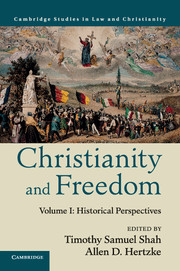Book contents
- Frontmatter
- The Religious Freedom Research Project
- Contents
- Contributing Authors
- Acknowledgments
- Introduction: Christianity and Freedom: Ancient Roots and Historical Innovations
- 1 The Roots of Religious Freedom in Early Christian Thought
- 2 The Christian Roots of Religious Freedom
- 3 Lactantius on Religious Liberty and His Influence on Constantine
- 4 Augustine and Religious Freedom
- 5 Christianity and the Roots of Human Dignity in Late Antiquity
- 6 Liberty of Conscience and Freedom of Religion in the Medieval Canonists and Theologians
- 7 Faith, Liberty, and the Defense of the Poor: Bishop Las Casas in the History of Human Rights
- 8 Calvinist Contributions to Freedom in Early Modern Europe
- 9 Constitutional Protection of the Freedom of Conscience in Colonial America: The Rhode Island and Pennsylvania Experiments
- 10 Christianity and Freedom in the American Founding
- 11 Vibrant Christian Pluralism and the Evolution and Defense of Religious Liberty in America
- 12 Orthodox Christian Contributions to Freedom: Historical Foundations, Contemporary Problematics
- 13 Christianity: A Straggler on the Road to Liberty?
- 14 Protestant Missionaries and the Centrality of Conversion Attempts for the Spread of Education, Printing, Colonial Reform, and Political Democracy
- 15 God and Freedom: Biblical Roots of the Western Idea of Liberty
- Index
4 - Augustine and Religious Freedom
Published online by Cambridge University Press: 05 May 2016
- Frontmatter
- The Religious Freedom Research Project
- Contents
- Contributing Authors
- Acknowledgments
- Introduction: Christianity and Freedom: Ancient Roots and Historical Innovations
- 1 The Roots of Religious Freedom in Early Christian Thought
- 2 The Christian Roots of Religious Freedom
- 3 Lactantius on Religious Liberty and His Influence on Constantine
- 4 Augustine and Religious Freedom
- 5 Christianity and the Roots of Human Dignity in Late Antiquity
- 6 Liberty of Conscience and Freedom of Religion in the Medieval Canonists and Theologians
- 7 Faith, Liberty, and the Defense of the Poor: Bishop Las Casas in the History of Human Rights
- 8 Calvinist Contributions to Freedom in Early Modern Europe
- 9 Constitutional Protection of the Freedom of Conscience in Colonial America: The Rhode Island and Pennsylvania Experiments
- 10 Christianity and Freedom in the American Founding
- 11 Vibrant Christian Pluralism and the Evolution and Defense of Religious Liberty in America
- 12 Orthodox Christian Contributions to Freedom: Historical Foundations, Contemporary Problematics
- 13 Christianity: A Straggler on the Road to Liberty?
- 14 Protestant Missionaries and the Centrality of Conversion Attempts for the Spread of Education, Printing, Colonial Reform, and Political Democracy
- 15 God and Freedom: Biblical Roots of the Western Idea of Liberty
- Index
Summary
Freedom is the right to obey the police.
Bertrand Russell on freedom according to Hegel.It is misleading to talk about whether figures from the fairly distant past were concerned with freedom in general and religious freedom in particular without first asking ourselves what the word “freedom” means and to what it refers – for them and for us. Specifically, it is essential to understand whether they believe the good for man is to be associated with the opportunity to choose only the good, or only to choose. On these questions Augustine's opinion (as that of many of his contemporaries) differs from the present Western consensus. That being so, I must start by commenting, however briefly, both on Augustine's rather complex account of freedom and on a common simplified and reductionist contemporary version. And I must ask why Augustine believed what he did and why our contemporaries tend to disagree with him. If I neglect to inquire in this way, I shall find myself comparing apples and oranges, as most people do when they discuss freedom, ancient and modern.
As the two views of freedom I shall present are substantially different – and dependent on radically different first principles – I shall also have to examine genealogically, again however briefly (for the basic facts are well known), why the ancient version was superseded and why its modern reductionist alternative has come (rightly or wrongly) to be held preferable. Only then will I be able adequately to confront Augustine's attitude to religious coercion – against the backdrop that in his day Christians had (and were widely and rightly believed to have had) the whip hand. Yet I shall also have to show that Augustine's views about freedom are not entirely coherent, or are perhaps underdeveloped, and ask whether, the whip being now in other hands, we Christians find that this somehow puts a completely different complexion on the matter. In brief, then, I shall have to ask what Augustine's views were, what they ought to have been, and what price he might have to pay (again rightly or wrongly) if he were to return to earth ready to accept some of the objections to his theories that will be outlined in the present paper.
- Type
- Chapter
- Information
- Christianity and Freedom , pp. 103 - 122Publisher: Cambridge University PressPrint publication year: 2016
- 2
- Cited by

